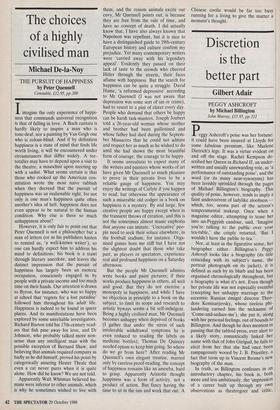The choices of a highly civilised man
Michael De-la-Noy
THE PURSUIT OF HAPPINESS Iimagine the only experience of happi- ness that commands universal recognition is that of falling in love. A Bach cantata is hardly likely to inspire a man who is tone-deaf, nor a painting by Van Gogh one who is colour-blind. And if by definition happiness is a state of mind that finds life worth living, it will be encountered under circumstances that differ widely. A tee- totaller may have to depend upon a visit to the theatre, a masochist upon meeting up with a sadist. What seems certain is that those who cooked up the American con- stitution wrote the most naive rubbish when they decreed that the pursuit of happiness was an inalienable right, for not only is one man's happiness quite often another's idea of hell, happiness does not even appear to be natural to the human condition. Why else is there so much unhappiness about?
However, it is only fair to point out that Peter Quennell is not a philosopher but a man of letters (or as his publishers hasten to remind us, `a well-known writer'), so one can hardly expect him to address his mind to definitions; his book is a trawl through literary anecdote, and leaves the distinct impression that the pursuit of happiness has largely been an esoteric occupation, consciously engaged in by people with a private income and too much time on their hands. Our attention is drawn to Byron, for instance, who was so happy at school that 'regrets for a lost paradise' followed him throughout his adult life. Happiness is indeed to be found in queer places. And its manifestations have been explored by some unreliable investigators. Richard Burton told his 17th-century read- ers that fish pine away for love, and Dr Johnson, who probably talked more non- sense than any intelligent man with the possible exception of Bernard Shaw, and believing that animals required company as badly as he did himself, proved his point by categorically assuring Hester Thrale that even a cat never purrs when it is quite alone. How did he know? We are not told.
Apparently Walt Whitman believed hu- mans were inferior to other animals, which is why he sometimes wished to live with them, and the reason animals excite our envy, Mr Quennell points out, is because they are free from the rule of time, and have no concept of death. I did actually know that, I have also always known that Napoleon was repellent, but it is nice to have a distinguished guide to 19th-century European history and culture confirm my prejudice. Yet many contemporary writers were `carried away with his legendary appeal'. Evidently they passed on their lack of taste to the crowds who cheered Hitler through the streets, their faces aflame with happiness. But the search for happiness can be quite a struggle. David Hume, 'a reformed depressive' according to Mr Quennell (I was not aware that depression was some sort of sin or crime), had to resort to a pint of claret every day. People who demand that others be happy can be harsh task-masters. Joseph Joubert told a 26-year-old woman whose mother and brother had been guillotined and whose father had died during the Septem- ber Massacres that he could not admire and respect her as much as he wished to do until she had shown the most beautiful form of courage, the courage to be happy.
It seems unrealistic to expect many of the writers and painters whose works of art have given Mr Quennell so much pleasure to prove in their private lives to be a reliable gauge of happiness. You may enjoy the writings of Carlyle if you happen to read, but otherwise the appearance of such a miserable old codger in a book on happiness is a mystery. By and large, few creative people are happy except when in the transient throws of creation, and this is not the sometimes almost manic euphoria that anyone can imitate. `Uncreative' peo- ple need to seek their solace elsewhere, in the football stadium, for instance. Orga- nised games bore me stiff but I have not the slightest doubt that those who take part, as players or spectators, experience real and profound happiness on a Saturday afternoon.
But the people Mr Quennell admires write books and paint pictures; if their works produce happiness in others, all well and good. But they do not exercise a monopoly in happiness, and while I have no objection in principle to a book on the subject, to limit its scope and research to artistic byways seems a bit self-indulgent. Being a highly civilised man, Mr Quennell becomes unhappy when deprived of books (I gather that under the stress of such intolerable withdrawal symptoms he is even reduced to reading the labels on medicine bottles); Thomas De Quincey needed opium to keep him going. So where do we go from here? After reading Mr Quennell's own elegant treatise, marred only by careless proof-reading, the concept of happiness remains like an amoeba, hard to grasp. Apparently Aristotle thought happiness was a form of activity, not a product of action. But fancy having the time to sit in the sun and work that out. A
Chinese coolie would be far too busy running for a living to give the matter a moment's thought.


























































 Previous page
Previous page